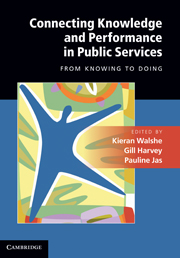Book contents
- Frontmatter
- Contents
- List of figures
- List of tables
- List of boxes
- Notes on contributors
- Foreword
- 1 Introduction: knowledge and performance – theory and practice
- 2 Knowledge from inspection: external oversight and information to improve performance
- 3 How is information used to improve performance in the public sector? Exploring the dynamics of performance information
- 4 Citizens, users or consumers: the voice of the public and its influence on improving performance
- 5 Competition and choice: the place of markets in connecting information and performance improvement
- 6 The role of corporate governance and boards in organisational performance
- 7 Change at the top: connecting political and managerial transitions with performance
- 8 The role of leadership in knowledge creation and transfer for organisational learning and improvement
- 9 Process Improvement and Lean Thinking: using knowledge and information to improve performance
- 10 Using evidence: how social research could be better used to improve public service performance
- 11 Absorptive capacity: how organisations assimilate and apply knowledge to improve performance
- 12 Knowing through doing: unleashing latent dynamic capabilities in the public sector
- 13 Conclusions: a puzzle, three pieces, many theories and a problem
- Index
- References
9 - Process Improvement and Lean Thinking: using knowledge and information to improve performance
Published online by Cambridge University Press: 05 July 2011
- Frontmatter
- Contents
- List of figures
- List of tables
- List of boxes
- Notes on contributors
- Foreword
- 1 Introduction: knowledge and performance – theory and practice
- 2 Knowledge from inspection: external oversight and information to improve performance
- 3 How is information used to improve performance in the public sector? Exploring the dynamics of performance information
- 4 Citizens, users or consumers: the voice of the public and its influence on improving performance
- 5 Competition and choice: the place of markets in connecting information and performance improvement
- 6 The role of corporate governance and boards in organisational performance
- 7 Change at the top: connecting political and managerial transitions with performance
- 8 The role of leadership in knowledge creation and transfer for organisational learning and improvement
- 9 Process Improvement and Lean Thinking: using knowledge and information to improve performance
- 10 Using evidence: how social research could be better used to improve public service performance
- 11 Absorptive capacity: how organisations assimilate and apply knowledge to improve performance
- 12 Knowing through doing: unleashing latent dynamic capabilities in the public sector
- 13 Conclusions: a puzzle, three pieces, many theories and a problem
- Index
- References
Summary
Introduction
Public sector organisations have made growing use of Business Process Improvement Methodologies (BPIMs), particularly Lean and Six Sigma, in recent years (Radnor and Boaden 2008). There are examples from a number of sectors, including health (Guthrie 2006; Fillingham 2007), central government (Radnor and Bucci 2007) and local government (Seddon 2004; ODPM 2005), both within the UK (Lodge and Bamford 2008) and the USA (Krings et al. 2006). The stated drivers for introducing BPIMs are the need to reduce costs and increase quality (Oakland and Tanner 2007) although Radnor and Walley (2008) suggest that within the public sector the drivers for introducing BPIMs have also included: government agendas; struggle with performance indicators; introduction of new leadership or technology; threat of competition; demand for increased efficiency; and the need for service expansion with limited resources.
BPIMs include approaches such as Lean Thinking, Six Sigma, Business Process Re-engineering (BPR), kaizen and Total Quality Management (TQM) as well as blended approaches such as Lean Six Sigma. This chapter will explore how the effective use and engagement with these approaches relies upon the use of information and knowledge in order to allow the generation and surfacing of ideas for improvement. The chapter will first examine the meaning and content of a range of BPIMs, and will then turn to explore how both explicit information and tacit knowledge are used and structured within them in order to support and bring about improvement.
Information
- Type
- Chapter
- Information
- Connecting Knowledge and Performance in Public ServicesFrom Knowing to Doing, pp. 173 - 198Publisher: Cambridge University PressPrint publication year: 2010
References
Accessibility standard: Unknown
Why this information is here
This section outlines the accessibility features of this content - including support for screen readers, full keyboard navigation and high-contrast display options. This may not be relevant for you.Accessibility Information
- 3
- Cited by
